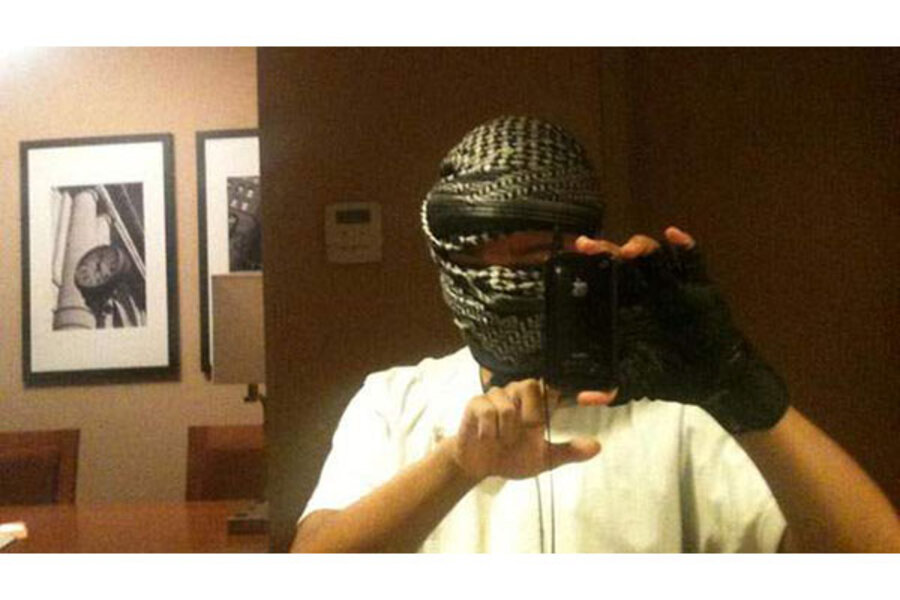John T. Booker of Topeka, Kan., came to the attention of the FBI as a result of questionable posts on his Facebook page.
Federal agents interviewed the 19 year old, who candidly admitted that he had an interest in waging jihad, according to court documents.
The admission was highly relevant. Mr. Booker was set to soon report for basic training in the US Army.
Instead of joining the Army, however, Booker got a job at Wal-Mart and continued to attend the Islamic Center of Topeka, where he alienated many members through his strident support for violent extremism. A mosque leader concluded that Booker was suffering from various mental health issues.
According to an FBI affidavit filed in court, Booker became an enthusiastic consumer of Islamic State videos showing grisly scenes of beheadings and bombings.
By October, a confidential source working for the FBI reported that Booker wanted to join the Islamic State group, but he didn’t know anyone who could help him make contact.
The following month, the confidential source told Booker he had a cousin who might be able to help Booker join IS. But Booker would have to prove his devotion to the cause, the affidavit says.
“I will kill any kuffar,” he replied, using the Arabic term for unbeliever. “If I was with [the Islamic State] and they said look, we are going to [attack] the White House right now… I would go with them without any question.”
In February, Booker told the confidential source that he wanted to make an IS propaganda video to “scare this country” and show that the Syria-based group had supporters in America.
In March, the confidential source introduced Booker to a second confidential FBI source who was posing as a sheikh planning terror attacks in the US.
Booker told them that he was inspired by an American Muslim who went to Syria where he drove a truck bomb into a Syrian Army outpost.
Booker called him “Jihad Joe.” His real name was Moner Mohammad Abusalha. His friends called him “Mo.” He grew up in a gated community in Vero Beach, Fla., and attended a local mosque. At some point, his devotion to Islam took a sharp turn to the extreme.
Shortly before his truck bomb attack, Mr. Abusalha recorded a video in which he urged Muslims in the US and other Western countries to travel to Syria.
“The most glorious thing is to die for Allah,” he said, dressed in a military jacket with an AK-47 resting on his shoulder. “Come to jihad. Fight for Allah.”
“The life of a mujahid is an unbelievable life,” he said. “Just sitting down five minutes drinking a cup of tea with a mujahid is better than anything I’ve ever experienced in my life.”
“This is the best life I’ve ever lived,” he said of his time in Syria.
He also delivered a warning to non-Muslims. “You think you are safe where you are in America or Britain or Indonesia or Jordan…. You think you are safe? You are not safe.”
Then he issued a warning to President Obama, Israel, and Syrian President Bashar al-Assad: “I have one word to say to you, kafir [unbeliever]. We are coming for you,” he said.
Booker said Abusalha’s video spoke directly to him. He told the undercover FBI sources that he wanted to carry out a suicide bombing at Fort Riley in Kansas. The military base is the home of the US Army’s 1st Infantry Division.
The FBI then went through the motions of building a bomb in a van that Booker could deliver. The device was, in fact, an inert decoy.
Just like Abusalha, Booker made a video in advance of his attack. After pledging allegiance to Islamic State leader Abu Bakr al-Baghdadi, he issued his own warning to America.
“Get your kids out. Get your soldiers out of the military. Because, I swear, the Islamic State is coming for them,” he said. “From inside, whether it be in their homes, whether it be on a base like this, whether it be in the recruiting stations, whether it be in the streets…. I swear, we are coming for them and we seek their blood because their blood is [permissible] for us to kill them.”
A month later, he recorded a second video. “This message is for you America. You sit in your homes and you think that this war is just over in Iraq…. I swear, today we will bring the Islamic State straight to your doorstep.”
On April 10, the two FBI operatives met with Booker and explained how to arm the “bomb.” Booker and one of the operatives then drove the device to a gate at the perimeter of Fort Riley, where Booker began to make what he thought would be the final connections to arm the device.
That’s when he was placed under arrest.
Booker is charged with attempting to use a weapon of mass destruction, attempting to use an explosive device, and attempting to provide material support to a foreign terror group. If convicted on the first charge he faces up to life in prison.





